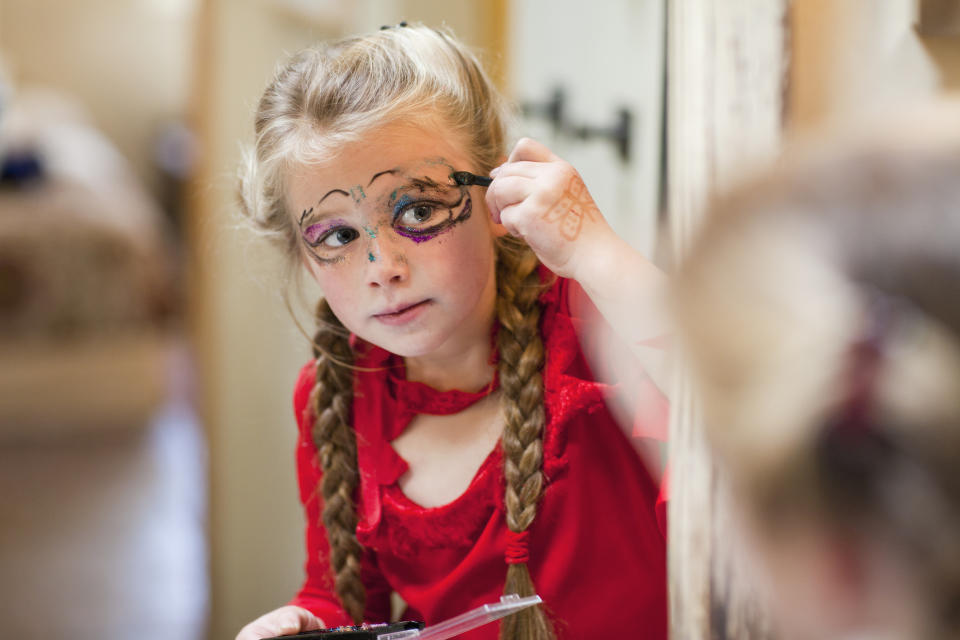A New Report Says Over 50% of Face Paints and Cosmetics Marketed to Kids Are Toxic

Want your kids to have a happy Halloween that's healthy, too? In addition to keeping track of the candy they eat, a new report recommends you steer clear of most face paint and children's lip balm, nail polish, and other cosmetics. Why?
The report, Pretty Scary 2: Unmasking Toxic Chemicals in Kids' Makeup, reveals that more than 50 percent of face paints and cosmetics marketed to kids contains at least one ingredient or contaminant linked to hormone disruption, developmental delays, learning difficulties, or cancer.
The report, issued by the Breast Cancer Fund and its Campaign for Safe Cosmetics, is based on research and lab testing done on 187 cosmetic products marketed to kids. Among the harmful ingredients found in these products are lead, cadmium, styrene, formaldehyde and volatile organic compounds (VOCs) like benzene and toluene.
"The presence of both lead and cadmium in kids' products is dangerously concerning," report the researchers. "The strong association of lead with neurological and intellectual impairments has led the Centers for Disease Control and Prevention to declare there is no safe blood level of lead."

"Cadmium is of particular concern due to its capacity to mimic estrogen and research linking cadmium to breast cancer," they also reported.
Among the products that were contaminated with VOCs were Disney Frog Lip Gloss, Disney Frozen stick-on nails, Disney Princess Lip Gloss, Hershey's Reese's lip balm, Hershey's Bubble Gum lip balm, Minions Nail Polish Pink, the Batman Party Makeup Set, and the Killer Clown Makeup Kit. Most of these products are commonly sold at big-box stores along with Halloween costumes and candy. Some of the VOCs researchers detected in them are associated with serious long-term health concerns, such as breast cancer and hormonal irregularities. In all cases, the concentrations of VOCs in kids' products were significantly higher than the limits EPA has set for drinking water.
That's particularly significant because "children are highly vulnerable to the effects of toxic chemicals during critical windows of development," say the researchers. Plus, kids might use face paint and other make-up all year round-they could have multiple exposures over time.

Most people assume the U.S. Food and Drug Administration (FDA) regulates cosmetics and personal care products in the same way it does food and drugs to assure safety. In fact, cosmetics are one of the least regulated consumer products on the market today, the researchers report. In addition, existing cosmetic safety law is over 75 years old and provides the FDA "with virtually no statutory power to perform even the most rudimentary functions to ensure the safety of an estimated $71 billion cosmetic industry."
The ingredients in cosmetic products sold via the Internet-a primary source of shopping for tweens, teenagers and their busy parents-don't actually have to be labeled. Neither do the ingredients in fragrance, even though 40% of the cosmetics and personal care products on the market today contain fragrance, a catch-all term for compounds that might consist of hundreds of chemicals-including known carcinogens, hormone-disruptors and other toxic offenders.

Breast Cancer Action Fund is working to get the federal government to update its regulations on cosmetics to protect kids. It's also encouraging manufacturers to eliminate chemicals in their products that are linked to cancer, birth defects, developmental harm and other health concerns.
In the meantime, here's how you can keep your kids safe.
Practice the Precautionary Principle, which advocates that it's better to be safe than sorry. Skipping face paint and cosmetics aimed at kids is the best way to make sure they won't be exposed to the chemicals identified in the Pretty Scary report.
Get your kids Halloween masks rather than paint their faces. Just be sure the masks only cover the eyes or the chin, not the nose or mouth. Kids can still have fun creating a great costume, but they won't be breathing in any chemicals from paints that might be applied to the mask.
Use stick-on tattoos that are easy to remove. Again, don't apply them around the nose or mouth.
Favor organic, plant-based cosmetics like powdered eye shadow, eyebrow pencil, bronzer, and blush. Have your child cover her mouth and nose if you're brushing on any powders that could be easily inhaled.
Avoid gluing on false eyelashes. Instead draw them on with an organic-based eyebrow pencil.
Use plant-based, organic lipstick and unflavored lip balm. Avoid lip balms that supposedly taste like candy, since all the kids will do is lick them off!
Skip perfume or other fragrances. Kids will be running around outside and no one will care what they smell like, anyway!
Avoid products that boast that they soak into the skin. That's not what kids need!
Wash off the make-up as soon as the kids get home. Make sure they don't fall asleep wearing it.
By the way, if you already have face paint at home for your kids, you could try reading the label to see what it contains. Toss or return the product if the ingredients include benzophenones, BHT, ethoxylated ingredients, formaldehyde, fragrance, mineral oil, parabens, petrolatum, silica, styrene compounds, and talc. Keep in mind that dangerous heavy metals like lead and cadmium won't show up in the ingredients list, since they can only be detected in a lab.
You Might Also Like

